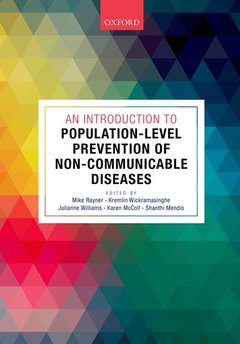Description
An Introduction to Population-level Prevention of Non-Communicable Diseases
Coordinators: Rayner Mike, Wickramasinghe Kremlin, Williams Julianne, McColl Karen, Mendis Shanthi
Language: English
Subject for An Introduction to Population-level Prevention of...:
Publication date: 03-2017
276 p. · 17x24.7 cm · Paperback
276 p. · 17x24.7 cm · Paperback
Description
/li>Biography
/li>
Non-communicable diseases (NCDs) kill more people than anything else in the world. They include cardiovascular diseases, such as heart attacks and strokes; cancers; chronic respiratory diseases, such as chronic obstructed pulmonary disease and asthma; and diabetes. In 2013, the World Health Organization published a global action plan for the prevention and control of NCDs which set a target to reduce death rates from NCDs by 25% by 2025. In response, countries have been drawing up national-level NCD prevention policies and programmes. New departments have been created by governments, NGOs, and other organizations to drive this agenda forward, creating a need for capacity building and training. In response to this need, the Nuffield Department of Population Health and the Department for Continuing Education at the University of Oxford initiated an accredited six-day short course on prevention strategies for non-communicable diseases with a population-based approach. In the past, many attempts to engage with NCD prevention have centred on individual-level interventions, such as screening and treating individual patients. In this new book, the course organisers provide a solid introduction to the population-based approach and bring together the concepts, evidence, and methods that define it. An Introduction to Population-Level Prevention of Non-Communicable Diseases takes readers through the entire policy cycle: from problem definition, solution generation, capacity building, and implementation to evaluation and monitoring. The book includes a wide range of case studies and practical examples of plans and projects that illustrate the real-life applications of theory. This book provides an unparalleled overview of population-based approaches to the prevention of non-communicable diseases, reflecting the latest research in the field. It is a key resource for anyone with an interest in NCD prevention, particularly early-career professionals working in governments, NGOs, health care institutions, and universities as they develop the knowledge and skills required for effective population-based prevention strategies.
Mike Rayner is a Professor of Population Health at the Nuffield Department of Population Health at the University of Oxford and Director of the Centre on Population Approaches for Non-Communicable Disease Prevention, based in that department. The Centre, which Mike founded in 1993, is a World Health Organisation Collaborating Centre and carries out research into the promotion of healthier and more sustainable environments particularly those related to diets and physical activity. Mike is also Chair of Sustain: the alliance for better food and farming in the UK and Chair of its Childrens Food Campaign. He is Chair of the Nutrition Expert Group for the European Heart Network. He is an ordained priest in the Church of England. Kremlin Wickramasinghe is a researcher at the Nuffield Department of Population Health at the University of Oxford. He joined the Centre on Population Approaches for Non-Communicable Disease Prevention (CPNP) in 2009 to work on the epidemiology of cardiovascular disease and associated risk factors. His research interests include multi-sectoral approaches to NCD prevention and implementation of NCD prevention strategies. The CPNP was awarded the status of World Health Organisation Collaborating Centre on Population Approaches for Non-Communicable Disease Prevention in 2013 and Kremlin is the Co-Director of the Collaborating Centre. He is also the Course Director for the Short course on prevention strategies for non-communicable diseases organised, by the University of Oxford. Julianne Williams is a doctoral candidate in Population Health at the University of Oxford. Broadly, her research seeks to clarify the complex relationships between peoples environments and their health behaviours and outcomes, especially in low- and middle-income countries. Her current research examines the influence of socio-economic and environmental factors on the health behaviours of adolescent schoolchildren in rural Sri Lanka. Previously, Julianne worked as a research
© 2024 LAVOISIER S.A.S.




